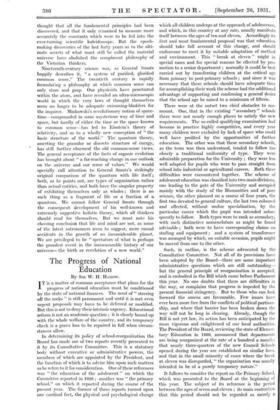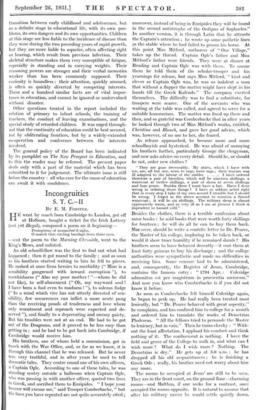The Progress of National Education By SIR W. H. HADOW.
TT is a matter of common acceptance that plans for the .11.- progress of national education must be conditioned by the state of national finances. The need of " steering off the rocks " is still paramount and until it is met even urgent proposals may have to be deferred or modified. But this is not to deny their intrinsic urgency. Educational reform is not an academic question ; it is closely bound up with the whole welfare of the country, and its temporary check is a grave loss to be repaired in full when circum- stances allow.
In determining its policy of school-reorganization the Board has made use of two reports recently presented to it by its Consultative Committee. This is a statutory body without executive or administrative powers, the members of which are appointed by the President, and the function of which is to advise him upon such matters as he refers to it for consideration. One of these references was " the education of the adolescent " on which the Committee reported in 1926 ; another was " the primary school," on which it reported during the course of the present year. The 'former of these reports turned upon one cardinal fact, the physical and psychological change which all children undergo at the approach of adolescence, and which, in this country at any rate, usually manifests itself between the ages of ten and eleven. Accordingly its first and most fundamental proposal was that education should take full account of this change, and should endeavour to meet it by suitable adaptation of method and environment. This " break at eleven " might in special cases and for special reasons be effected by pro- motion to a senior department ; normally it could be best carried out by transferring children at the critical age from primary to post-primary schools ; and since it was necessary that these schools should have adequate time for accomplishing their work the scheme had the additional advantage of supporting and confirming a general .desire that the school age be raised to a minimum of fifteen.
There were at the outset two chief obstacles to sur- mount. One, that in the existing " secondary " schools there were not nearly enough places to satisfy the new requirements. The so-called qualifying examination had become in practice highly competitive, and every year many children were excluded by lack of space who could well have profited by the opportunities of further education. The other was that these secondary schools, as the term was then understood, tended to follow too closely a traditional uniformity of type. They were admirable preparation for the University ; they were less well adapted for pupils who were to pass straight from school into industrial or agricultural careers. Both these difficulties were encountered together. The scheme of adolescent education was classified into two main divisions, one leading to the gate of the University and occupied mainly with the study of the Humanities and of pure science, the other planned on a course of four years, the first two devoted to general culture, the last two coloured and affected, without undue specialization, by the particular career which the pupil was intended subse- quently to follow. Both types were to rank as secondary, with such distinctive nomenclature as might be found advisable ; both were to have corresponding claims on staffing and equipment ; and a system of transference was arranged by which, on suitable occasion, pupils might be moved from one to the other.
Such, in outline, is the scheme advocated by the Consultative Committee. Not all of its provisions have been adopted by the Board—there are some important administrative questions which are still outstanding— but the general principle of reorganization is accepted, and is embodied in the Bill which came before Parliament this year. No one doubts that there are difficulties in the way, or complains that progress is impeded by the present financial stringency. But to those who can look forward the omens are favourable. Few issues have ever been more free from the conflicts of political partisan- ship, and where that barrier has been broken down the way will not be long in clearing. Already, though the Bill is not yet law, its action has been anticipated by the more vigorous and enlightened of our local authorities. The President of the Board, reviewing the state of Elemen- tary Education in 1930, announced that departments are being reorganized at the rate of a hundred a month ; that nearly three-quarters of the new Council Schools opened during the year are established on similar lines, and that in the small minority of cases where the break at eleven was disregarded, " the organization was usually intended to be of a purely temporary nature."
It follows to consider the report on the Primary School, which was presented to the Board at the beginning of this year. The subject of its reference is the period between the ages of seven and eleven ; its main contention that this period should not be regarded as merely a transition between early childhood and adolescence, but as a definite stage in educational life, with its own pro- blems, its own dangers and its own opportunities. Children at this stage are less liable to the incidence of disease than they were during the two preceding years of rapid growth, but they are more liable to sequelae, often affecting sight or hearing, which result from previous infection. Their skeletal structure makes them very susceptible of fatigue, especially in standing and in carrying weights. Their reasoning powers are stronger and their verbal memories weaker than has been commonly supposed. Their curiosity is boundless : their attention, quickly aroused, is often as quickly diverted by competing interests. These and a hundred similar facts are of vital impor- tance in education, and cannot be ignored or undervalued without disaster.
Other questions treated in the report included the relation of primary to infant schools, the training of teachers, the conduct of leaving examinations, and the special study of retarded children. It was urged through- out that the continuity of education could be best secured, not by obliterating frontiers, but by a widely-extended co-operation and conference between the interests involved.
The general policy of the Board has been indicated by its pamphlet on The New Prospect in Education, and to this the reader may be referred. The present paper deals only with a part of the material which has been submitted to it for judgement. The ultimate issue is still before the country : all who care for the cause of education can await it with confidence.



































 Previous page
Previous page